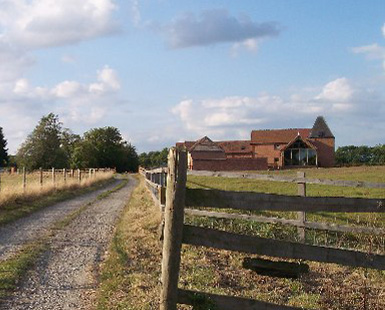Make the most of your outbuildings
A new policy could allow country-house owners to convert outbuildings to a different use without having to apply for planning permission


Great opportunities lie in store for country-house owners. At the end of last month, the Government said that it would introduce new Permitted Development Rights (PDRs to make it easier for people to put redundant or under-utilised buildings to new uses. The policy, which should come into force in the spring, will allow office space to be turned into residential units without need for planning consent, but a less publicized rule will also simplify the conversion of agricultural buildings to other, non-residential uses.
Although the move is expected to have the greatest impact on cities, where office stock has been languishing empty while pressure has been growing on housing, it should also prove beneficial to the countryside. ‘In the country, particularly now that, with the recession, people are downsizing, some rural offices no longer serve a purpose,' points out Knight Frank's head of rural consultancy, James Del Mar (01488 688500). ‘Some will become vacant, so this offers a logical opportunity to convert them to residential use. It's a sensible but also sensitive policy: rather than build new houses in unsuitable locations, you can have them in sustainable ones.'
However, landowners need to weigh the pros and cons of converting their barn offices into homes, cautions Rob Fanshawe of buying agent Property Vision (01635 813130). ‘In parts of the countryside, the pressure on residential lettings is very high, and if you turned your home office into a one-bedroom flat, you could let it out quite well.

* Subscribe to Country Life and save
On the other hand, there are real advantages in having a country office in place, starting with Stamp Duty. If a property worth more than £2 million [not purchased through a company] qualifies as mixed use, the Stamp Duty rate applicable to it is only 4%, against the 7% levied on residential property. And if it has office space, we would always argue the case for mixed use.' Other factors to take into account include the costs of converting an office into a house, which can be high, and the potential inconvenience of having residential tenants. ‘Offices mean you have cars and people on weekdays during working hours, whereas residences mean a presence during the evening and at weekends,' notes Savills' Roly Beazley (01603 229215). Both Mr Beazley and Mr Fanshawe believe that country house owners stand to benefit rather more from the provision that allows them to convert a farm building to another nonresidential use without requiring planning consent.
‘Landowners are increasingly struggling with the costs and timings of the planning process,' says Mr Beazley. ‘You would expect most redundant farm buildings to be eligible for change of use anyway, but this removes the extra barrier.' Mr Fanshawe thinks the welcome reduction in red tape will help create extra income. ‘You could turn a redundant barn into an equestrian facility, or storage space-good watertight buildings are very much in demand these days. Plus, buyers really value flexibility and having a building that can be put to many uses without hassle is a major plus.'
However, explains Savills' planning director David Henry (01223 347253), ‘this isn't a free for- all. There are clear limits of what can and can't be done and people need to be aware of them. For example, you'll be able to change a building's use but not make physical alterations to it- for those, you may still need planning consent. And you'll have no right to change a redundant barn into a house unless it's already an office-it's important to clarify this as some people got their wires crossed.' Pre-existing planning restrictions could also preclude the new PDRs in some cases.
Exquisite houses, the beauty of Nature, and how to get the most from your life, straight to your inbox.
The details of the new policy are still being ironed out-for example, a limit will be set on the size of agricultural buildings to be converted, and some areas of the country could be exempt from the new PDRs if councils prove that they would adversely affect the local economy. But one thing is clear: country-house owners who would like to take advantage of the new rights need to act quickly.
The measures currently have a lifespan of three years, after which they will be re-evaluated and may not be renewed. ‘People should start doing their homework now to see whether there's any benefit in changing a building's use and whether any alterations are necessary,' urges Mr Henry. ‘If you leave it too late, you could find that the window of opportunity has closed.
* Follow Country Life property on Twitter
Country Life is unlike any other magazine: the only glossy weekly on the newsstand and the only magazine that has been guest-edited by His Majesty The King not once, but twice. It is a celebration of modern rural life and all its diverse joys and pleasures — that was first published in Queen Victoria's Diamond Jubilee year. Our eclectic mixture of witty and informative content — from the most up-to-date property news and commentary and a coveted glimpse inside some of the UK's best houses and gardens, to gardening, the arts and interior design, written by experts in their field — still cannot be found in print or online, anywhere else.

